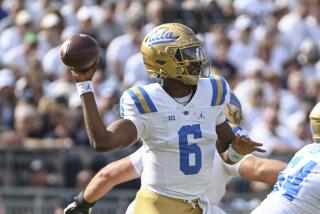Stanford, at Less Than Best, Is Plenty : Blockbuster: The Cardinal beats Penn State, 24-3, for first 10-victory season since 1940.
- Share via
MIAMI — If Friday’s Blockbuster Bowl was a game that geniuses and legends are made of, then college football is in trouble.
The much-ballyhooed matchup of coaching greats Bill Walsh and Joe Paterno was anything but a game for the ages. There were 18 punts, four interceptions and two fumbles, all of which seemed to prolong a game that was essentially over in the first quarter.
In the end, Stanford beat Penn State, 24-3, before 45,554.
“Obviously, we didn’t play as we had hoped,” Walsh said. “And I don’t think this was one of Joe’s better teams. . . . As a matter of fact, it’s real credit to him that his team won as many games as it did.”
Walsh’s comment was meant as a compliment, but it accurately summarized how badly Penn State played.
“We didn’t play very well,” Paterno said. “We just got a good licking out there. It’s frustrating.”
The victory capped the first 10-victory season for Stanford since 1940. The Cardinal finishes the season 10-3 and will probably improve on its No. 13 ranking.
It was an accomplishment not lost on Walsh.
“We’ve just completed a wonderful season,” Walsh said. “I need to credit Dennis Green for establishing the program. I just got to go along for the ride.
“Any time in a season you beat a Penn State, a Notre Dame, USC and UCLA, that’s pretty good for us.”
A lot of teams beat USC and UCLA this season, so Walsh’s comment was meant in a historical context.
Walsh, who was working as a broadcaster for NBC, came back to Stanford when Green left to coach the Minnesota Vikings. Walsh had coached Stanford in 1977 and ’78.
The other marquee matchup of Stanford’s fine runner Glyn Milburn and Penn State’s O.J. McDuffie never really gained momentum.
Milburn gained only 19 yards in nine carries. He also caught four passes for 54 yards, including one of 40 yards for the game’s final touchdown.
“Now I just want to take this jersey off and celebrate, but it’s going to be hard,” Milburn said.
McDuffie had a better day, catching six passes for 111 yards. Paterno threw a wrinkle into the offense, though, lining McDuffie up at tailback several times. It was the first time McDuffie had worked from the backfield, and, like most Penn State experiments, it failed. He gained only seven yards in four carries.
However, like Walsh, McDuffie chose to look at the big picture.
“I’ve had a great career,” the holder of 15 Penn State records said. “I broke a few records and met some great people. It’s now time to move on. . . . I could have done some things to keep us in it, but I don’t know if it could have helped us win.”
The game started as if it would develop into a memorable one.
On Stanford’s first possession, it moved 71 yards in eight plays to take a 7-0 lead. The touchdown came on a two-yard pass from Steve Stenstrom to Ryan Wetnight. Wetnight made two other receptions for 16 and 29 yards on the drive.
But Penn State came back driving 65 yards in 10 plays before settling for a 33-yard field goal by V.J. Muscillo.
Little did the Nittany Lions realize that they were already hopelessly behind.
Stanford next scored with about three minutes to play in the half on a five-yard run by J.J. Lasley. The big plays were a 34-yard gain by Ellery Roberts and a 17-yard pass from Stenstrom to Wetnight.
Stanford got its remaining scores in the third quarter on a 28-yard field goal by Eric Abrams and Stenstrom’s 40-yard pass to Milburn.
Stenstrom, a junior quarterback from El Toro, completed 17 of 28 passes for 210 yards.
“We had everything together today as opposed to the last two games,” he said. “The offensive line gave me a lot of time.”
It was too much time for Penn State, which finished 7-5 and will probably relinquish its No. 21 ranking.
“It’s very frustrating,” Paterno said. “We obviously weren’t sharp, and I have to take the blame for that. But, I think I know what the problems are and how to go about solving them. We’ll go to work and be a good football team next year.”
Walsh gets to spend an entire off-season preparing his team for 1993.
“This is what I love and really want to do,” Walsh said. “I don’t miss being a broadcaster at all. . . . All I did as a broadcaster was try and memorize hobbies and hometowns.”
More to Read
Go beyond the scoreboard
Get the latest on L.A.'s teams in the daily Sports Report newsletter.
You may occasionally receive promotional content from the Los Angeles Times.










